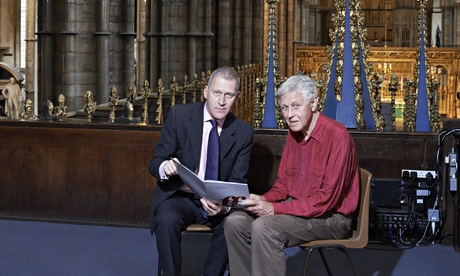
As Britain has remembered and commemorated the first world war, which plunged Europe into darkness and despair 100 years ago, there have been moments of argument and polemic.
Was the greatest and bloodiest conflict the continent had ever known justified by the need to thwart Germany's aggressive expansionism? Or was the conflagration a collective folly leading to the needless sacrifice of millions of lives?
Last January, the then education secretary, Michael Gove, took issue with what he described as "Blackadder myths" that present Britain's conduct of the war as "a misbegotten shambles". But as we approach the centenary of the summer's day when the country tipped over the precipice into war, such controversies are being left behind.
A specially devised vigil at Westminster Abbey, to be broadcast live on BBC2, will begin at 10pm on Monday 4 August and end to the chimes of Big Ben at 11pm – the moment when war was declared and four years of agony began.
The final piece of music for the vigil has been composed by David Matthews, Benjamin Britten's pupil and biographer, who has long been haunted by the horrors of 1914-18. The stark, brutal beauty of his work reflects the composer's desire to focus on the suffering, pain and terrible loss that scarred a continent. Matthews's anthem is entitled "To what God shall we chant our songs of battle?" and was commissioned by the abbey choir for the service.
"Like so many others, my family suffered losses in that terrible war," the composer told the Observer. "My maternal grandfather, Augustus Walters, was killed in a tank just weeks before the end.
"The casualty figures were appalling and, tragically, the authorities could have done so much more to bring it to a close sooner."
Matthews, a senior figure in Britain's contemporary musical pantheon, with seven symphonies and a dozen string quartets to his name, has produced a work which abbey organist and master of the choristers, James O'Donnell, says "leaves you standing on the edge of an abyss". The piece takes its title from lines in a bitter, disillusioned poem written in 1914 by Harold Monro. His uncompromising words were chosen by the abbey, along with two passages from the Book of Lamentations and Saint Luke's gospel.
"We felt we ought to combine a strong poetic utterance with some scriptural text," said O'Donnell, "and David has produced something quite chilling in response. It was also important that we have some newly minted music for this moment, a reflection from today on those solemn times."
The abbey will fade into darkness as the service goes on, echoing the words attributed to the foreign secretary of the day, Sir Edward Grey, as he looked out over St James's Park from his window in the Foreign Office: "The lamps are going out all over Europe; we shall not see them lit again in our lifetime."
More than 1,000 candles, held by the congregation and in the abbey's 16 majestic chandeliers, will be slowly extinguished until a single flame remains, at the grave of the unknown warrior. This will be snuffed out at 11pm by the Duchess of Cornwall, marking the exact moment of the declaration of war in 1914.
The service – which will be the culmination of a day of commemorations at Glasgow Cathedral and the Saint Symphorien military cemetery at Mons, Belgium – will hinge around pairings of 1914 poetry and scripture with prayers and choral works. Author and broadcaster Sebastian Faulks will read from his novel Birdsong.
The vigil has been devised by the Rev Dr James Hawkey, precentor at the abbey, who, writing in the Church Times, said: "Etymologically, the concept of 'vigil' encourages us to stay awake as the light fades away – to watch, and not to flee as we mark that last hour of peace, conscious with hindsight of the alarming enormity of the looming mechanised slaughter of the next four years.
"We need to be honest about the horror of all this, without rushing to adopt particular narratives or apportion blame. Rather, our penitence will be for the frailty that leads to inexorable cycles of violence, feeds our need to find scapegoats, and rushes to sort out disagreements by annihilating the other."
The abbey is encouraging churches all over the country to devise vigils of their own and is publishing resources on its website to help them achieve this.

